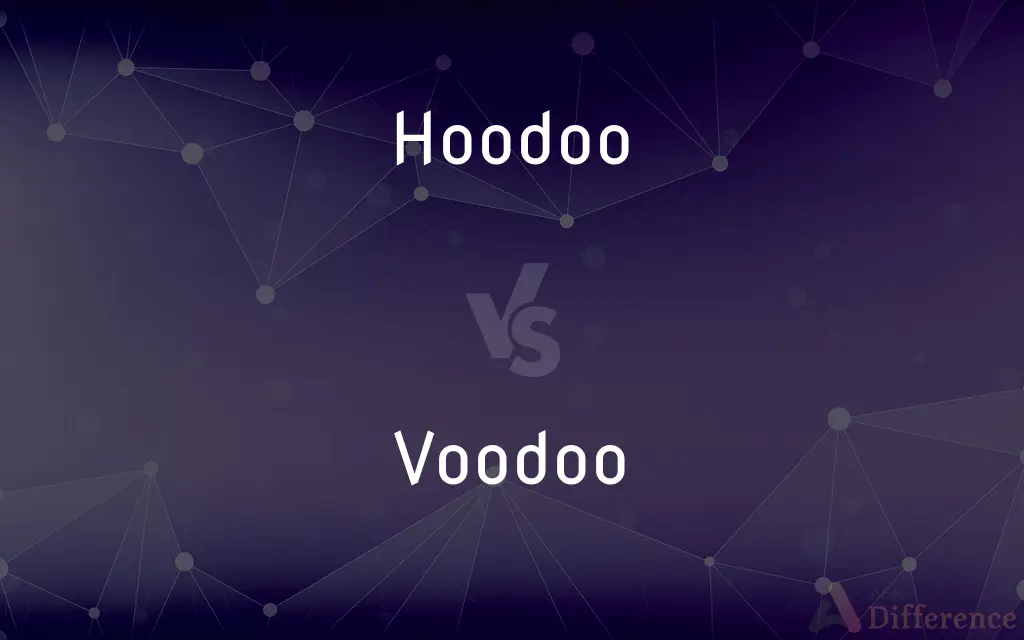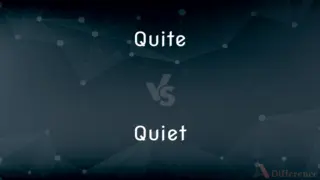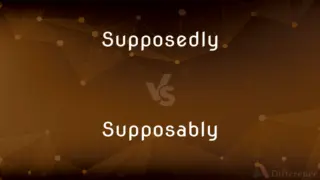Hoodoo vs. Voodoo — What's the Difference?
Edited by Tayyaba Rehman — By Fiza Rafique — Updated on October 5, 2023
"Hoodoo" is a folk magic practice with roots in African traditions; "Voodoo" is a religion originating in West Africa, practiced notably in Haiti and Louisiana. Differentiating: Hoodoo is magical practice, Voodoo is religion.

Difference Between Hoodoo and Voodoo
Table of Contents
ADVERTISEMENT
Key Differences
"Hoodoo" and "Voodoo," while often erroneously used interchangeably, present distinct cultural and spiritual frameworks. "Hoodoo" refers to a set of spiritual practices, traditions, and beliefs originated from African spiritual traditions, which have evolved into a unique system of folk magic primarily in the Southern United States. In contrast, "Voodoo" delineates a structured, formal religious system rooted in West African Vodun, transplanted and transformed within diasporic movements, notably in Haiti and Louisiana.
"Hoodoo," predominantly, functions without centralized religious authorities, institutions, or standardized practices. It commonly incorporates practices such as rootwork and conjure and is known to utilize herbs, roots, and other materials to create charms or spells. On the other hand, "Voodoo" often involves formalized rituals, priesthood, and congregational worship practices, embodying a structured religious institution, with defined deities, spirits (Loas or Lwas), and ritual practices.
Examining "Hoodoo," we witness a focus on individual spiritual empowerment and practices that aim for practical outcomes, such as love, protection, and prosperity. "Voodoo," whilst also possessing practical elements in its rites and rituals, holds a broader theological and cosmological framework, exploring the relationships between practitioners, spirits, ancestors, and deities, and addressing themes of community, servitude to the spirits, and cosmic balance.
In the cultural and geographical context, "Hoodoo" is generally associated with the Southern United States and develops in alignment with the cultural and spiritual practices of enslaved Africans in this region, subsequently interfacing with Native American and European folk magic traditions. Conversely, "Voodoo" finds potent expressions in places like Haiti (Haitian Vodou) and Louisiana (New Orleans Voodoo), reflecting distinct yet related religious systems that emerged through the blending of West African, Indigenous, and European spiritual practices and beliefs during the times of the Atlantic slave trade.
Lastly, "Hoodoo" tends to exhibit a more eclectic and individualistic nature in its practice, often integrating elements from various other spiritual systems and adapting to the personal beliefs and needs of the practitioner. Whereas "Voodoo," while also adaptive and syncretic in different contexts (such as integrating Catholic saints and practices), retains a coherent religious structure and identity, with specific rites, doctrines, and mythologies that are adhered to by its practitioners.
ADVERTISEMENT
Comparison Chart
Nature
Folk magic practice
Structured religion
Origin
African spiritual traditions
West African Vodun
Practice
Individualistic, practical magic
Community rituals, structured practices
Deities/Spirits
Not typically worshipped
Worshipped and served (Loas/Lwas)
Regional Associations
Southern United States
Haiti, Louisiana
Compare with Definitions
Hoodoo
Folk tradition with African roots.
Hoodoo incorporates ancient African spiritual concepts.
Voodoo
Encompasses a broad theological framework.
Voodoo explores relationships between practitioners, ancestors, and spirits.
Hoodoo
Involves conjure and rootwork.
The Hoodoo practitioner crafted a charm using rootwork.
Voodoo
A structured African diasporic religion.
Voodoo in Haiti involves complex rituals and spiritual hierarchies.
Hoodoo
A set of magical practices.
He utilized Hoodoo practices for protection.
Voodoo
Utilizes ritual practices and ceremonies.
A Voodoo ceremony might involve dance, song, and offerings to the spirits.
Hoodoo
Utilizes physical objects for spells.
In Hoodoo, different herbs hold specific magical properties.
Voodoo
Is practiced communally.
Voodoo rituals often involve collective participation and community engagement.
Hoodoo
Focuses on practical, everyday outcomes.
People might employ Hoodoo to bring fortune or love.
Voodoo
A black religious cult practised in the Caribbean and the southern US, combining elements of Roman Catholic ritual with traditional African magical and religious rites, and characterized by sorcery and spirit possession
If you understand voodoo you can talk to these spirits
A voodoo priest
They can use voodoo to help people
A voodoo doll
Hoodoo
Voodoo or witchcraft
A visit to a local hoodoo doctor
Voodoo
Affect (someone) by the practice of voodoo
Someone had voodooed her
Hoodoo
A column or pinnacle of weathered rock
A towering sandstone hoodoo
Voodoo
A religion of West African origin practiced chiefly in Haiti and other Caribbean countries, based on animism, magic, and elements of Roman Catholic ritual, and characterized by belief in a supreme God and a large pantheon of local and tutelary deities, deified ancestors, and saints, who communicate with believers in dreams, trances, and ritual possessions. Also called vodoun.
Hoodoo
Bewitch
She's hoodooed you
Voodoo
A practitioner, priest, or priestess of voodoo.
Hoodoo
Magic healing and control, especially in African-based folk medicine in the United States and the Caribbean.Also called conjure.
Voodoo
Deceptive or delusive nonsense.
Hoodoo
A practitioner of hoodoo.
Voodoo
To place under the influence of a spell or curse; bewitch.
Hoodoo
Voodoo.
Voodoo
Of or relating to the beliefs or practices of voodoo.
Hoodoo
Bad luck.
Voodoo
Based on unrealistic or delusive assumptions
Voodoo economics.
Hoodoo
One that brings bad luck.
Voodoo
Any of a group of related religious practices found chiefly in and around the Caribbean, particularly in Haiti and Louisiana.
Hoodoo
(Geology)A column of eccentrically shaped rock, produced by differential weathering.
Voodoo
The spiritual beliefs of the Ewe/Fon of West Africa, practiced chiefly in Benin and in the south of Togo.
Hoodoo
To practice hoodoo on; affect with a charm or curse.
Voodoo
(pejorative) Any sort of magical or irrational approach to a problem.
I want a real explanation, not this statistical voodoo.
Hoodoo
To bring bad luck to.
Voodoo
(dated) One who practices voodoo; a native sorcerer.
Hoodoo
(uncountable) A set of spiritual practices and traditions created and concealed from slave-owners by enslaved Africans in North America, based on traditional African beliefs.
Voodoo
To bewitch someone or something using voodoo
He claimed his neighbor had voodooed him.
Hoodoo
A practitioner of voodoo.
Voodoo
See Voodooism.
Hoodoo
Supernatural bad luck, or something or someone believed to bring bad luck.
Voodoo
One who practices voodooism; a negro sorcerer.
Hoodoo
(geology) A tall thin spire of rock that protrudes from the bottom of arid basins and badlands.
Voodoo
Of or pertaining to voodooism, or a voodoo; as, voodoo incantations.
Hoodoo
(transitive) To jinx; to bring bad luck or misfortune to.
Voodoo
A charm superstitiously believed to embody magical powers
Hoodoo
One who causes bad luck.
Voodoo
A religious cult practiced chiefly in Caribbean countries (especially Haiti); involves witchcraft and animistic deities
Hoodoo
Same as voodoo.
Voodoo
Bewitch by or as if by a voodoo
Hoodoo
Bad luck.
Voodoo
Involves the worship of spirits (Loas/Lwas).
In Voodoo, practitioners often serve and build relationships with the Loas.
Hoodoo
A natural rock pile or pinnacle of fantastic shape.
Hoodoo
To be a hoodoo to; to bring bad luck to by occult influence; to bewitch.
Hoodoo
A column of weathered and eccentrically shaped rock;
A tall sandstone hoodoo
Hoodoo
A practitioner of voodoo
Hoodoo
A charm superstitiously believed to embody magical powers
Hoodoo
Something believed to bring bad luck
Hoodoo
Bring back luck; be a source of misfortune
Common Curiosities
Is Hoodoo a religion?
No, Hoodoo is a system of folk magic, not a religion.
Is Voodoo recognized as a religion?
Yes, Voodoo is recognized as a religion.
Does Voodoo involve animal sacrifice?
Yes, some Voodoo rituals involve animal sacrifices.
Can Voodoo be practiced privately?
While Voodoo emphasizes community, some practices can be done privately.
Are Hoodoo and Voodoo connected in any way?
Yes, both have roots in African spiritual practices but have evolved differently.
Can Voodoo priests marry?
Yes, Voodoo priests (Houngans) and priestesses (Mambos) can marry.
Can Hoodoo be practiced by anyone?
Yes, Hoodoo can be practiced by anyone who studies its techniques.
Is Hoodoo only practiced in the United States?
Hoodoo is most associated with the Southern United States, but can be practiced anywhere.
How is Haitian Vodou different from Louisiana Voodoo?
They have different influences and practices due to their distinct cultural histories.
Does Hoodoo involve harm towards others?
Hoodoo includes both benign and malevolent spells, depending on the practitioner.
What role do Loas play in Voodoo?
Loas are spirits served in Voodoo, forming crucial aspects of worship and ritual.
Is Hoodoo compatible with other spiritual beliefs?
Yes, Hoodoo is often practiced alongside other religious and spiritual beliefs.
Is Voodoo evil or dangerous?
No, Voodoo is a legitimate religion and is not inherently evil or dangerous.
Is Hoodoo only about casting spells?
While spellwork is central, Hoodoo also involves herbalism, divination, and spiritual work.
Can Hoodoo spells be reversed?
Yes, Hoodoo practitioners often provide means to undo or reverse spells.
Share Your Discovery

Previous Comparison
Quite vs. Quiet
Next Comparison
Supposedly vs. SupposablyAuthor Spotlight
Written by
Fiza RafiqueFiza Rafique is a skilled content writer at AskDifference.com, where she meticulously refines and enhances written pieces. Drawing from her vast editorial expertise, Fiza ensures clarity, accuracy, and precision in every article. Passionate about language, she continually seeks to elevate the quality of content for readers worldwide.
Edited by
Tayyaba RehmanTayyaba Rehman is a distinguished writer, currently serving as a primary contributor to askdifference.com. As a researcher in semantics and etymology, Tayyaba's passion for the complexity of languages and their distinctions has found a perfect home on the platform. Tayyaba delves into the intricacies of language, distinguishing between commonly confused words and phrases, thereby providing clarity for readers worldwide.
















































